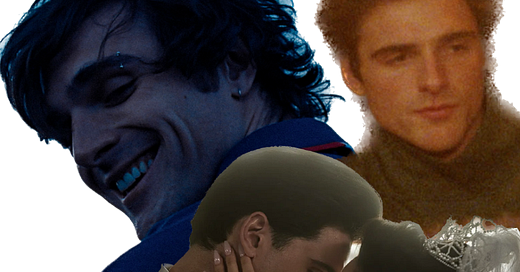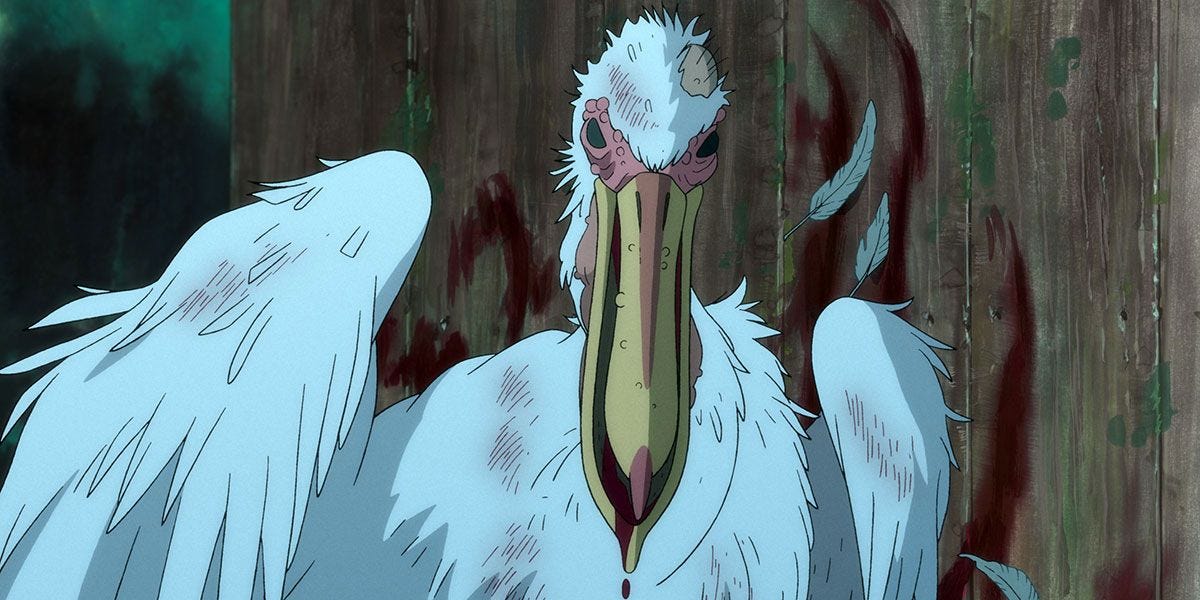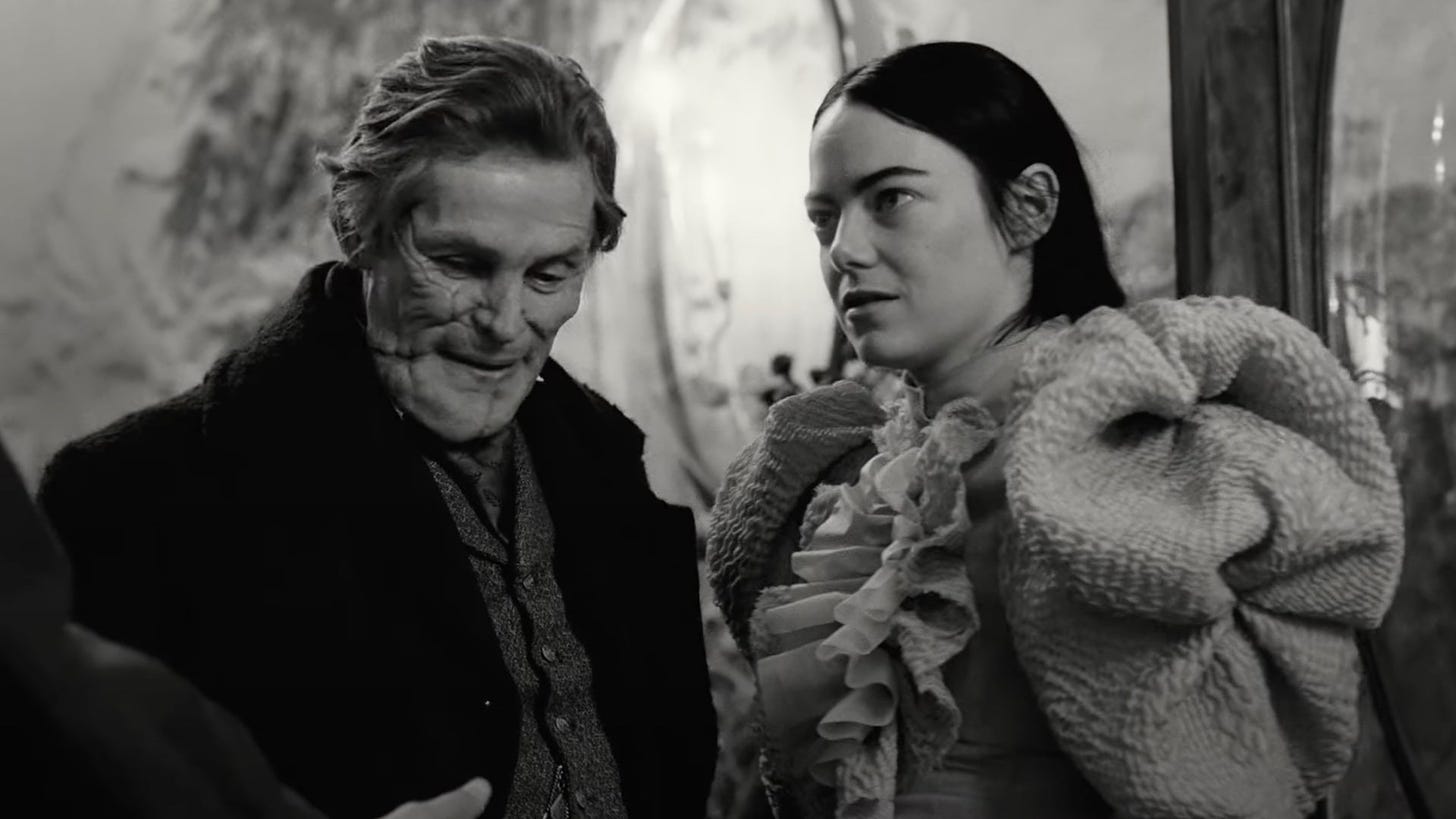The week’s two major theatrical releases are Yorgos Lanthimos’ latest oddity and Hayao Miyazaki’s alleged final movie, and both are terrific. They have a surprising number of things in common: both take us on a journey through a fantastical realm, Willem Dafoe is in both casts, and they explore the meaning of human existence through one simple question: how do you live?
But first…
Jacob Elordi, Three Ways
Through a weird coincidence of timing, the culture’s newest indie heartthrob can be seen in three different movies that are currently in theaters. Each of these movies utilize Jacob Elordi’s good looks and innate celebrity energy in unique ways.
Sofia Coppola’s new film may be called Priscilla, but it’s Elvis Presley who dominates the frame, literally and figuratively. The director gets so much mileage out of the massive height discrepancy between Elordi and his co-star Cailee Spaeny which, along with costuming, styling, and acting, turn a one year age difference between the two actors into a wide gulf. This is a different Elvis Presley than the one portrayed by Austin Butler in last year’s Elvis movie. There aren’t really any scenes in Priscilla that show Elvis Presley on the stage, where he was at his most captivating. The film focuses on another side of Elvis, the side that controlled and strung along a girl much too young for him. Elordi hits the story beats perfectly, his doe-eyed charm morphing into stomach churning menace. Of the three movies, this is where he shows the best of his acting abilities. The only false note in his performance is an unintentionally hilarious line reading. When he utters, in a low Tennessee twang, “I’m gonna be a daddy,” the audience burst into laughter.
Jacob Elordi has drawn headlines for his recent remarks about The Kissing Booth, distancing himself from the wildly successful franchise that introduced him to the world. With his appearances in scrappier, indie-adjacent projects, he basically plays a version of himself in The Sweet East, the scrappiest and most independent of these three new movies. Elordi makes a brief appearance as a famous young actor who fuels tabloid headlines but wants to pivot his career towards scrappier, independent projects. Sound familiar? It’s this small role that shows how the actor (and his agent) is modeling his career off of Robert Pattinson, who successfully followed a path from teen sensation to indie cred to balancing weirder projects with blockbusters. But hopefully Elordi won’t meet a similar fate as his Sweet East avatar.
If you just want to see a movie that gives you the most opportunity to lust after the tall Aussie, Saltburn is gonna be your vibe. Emerald Fennell’s wildly entertaining tale of England’s class divisions showcases Elordi a privilege-blind rich kid who is kind and graceful only because he can literally afford it. Cinematographer Linus Sandgren shoots the actor as if he were a Grecian demigod, with the camera pointed up towards him, emphasizing how he lords over the other kids at Oxford. The sun is blazing behind him, his hair is perfectly tousled. We understand why Barry Keoghan’s middle class social climber is immediately attached/attracted to him. He’s the guy who floats above the fray, and Elordi is certainly on top of the world right now.
Moving on to movies that do not star Jacob Elordi…
The Boy and the Heron
This has been in limited release for the past couple weeks, and the wide release is on December 8.
Perhaps you didn't understand it. I myself don't understand it.
— Hayao Miyazaki, introducing his (alleged) final film at a preview screening
Right there with you, brother. The Boy and the Heron is perhaps the hardest film of his to grapple with — it's certainly the most Miyazaki. It's a big mishmash of the themes and settings of his prior movies, a retrospective masquerading as a new work. But this film, intended to be his last, is not an easy celebration of his legacy. Rather, Miyazaki grapples with the inherent failure of asking life’s unanswerable questions. The Japanese title, How Do You Live?, could be the thesis statement for Heron as well as many of Miyazaki’s best works.
Story-wise, it’s a surprisingly bold, weird, messy movie. There’s a lot of disparate elements culled together from many of his stories: post-War trauma, the destruction of nature, grief, a child spirited away into a fantastical world. It lead to things feeling a bit rushed, at times bordering on incoherence, and there’s characters who could have used a lot more screentime. I spent a lot of time just trying to figure out what everything was leading up to.And yet... the film ends with an emotional wallop. As shaggy as Heron can be, it feels very much like a last testament. I'll leave it there for now as I definitely need a second viewing to really take it all in. It’s imperfect, but it’s a masterpiece.
(I saw The Boy and the Heron in Japanese, but my next watch will be the English dub because the cast is nuts.)
Poor Things
Opens December 8 at at few theaters in New York, LA, SF, and Austin. Expands wider in the coming weeks.
Yorgos Lanthimos, famous for prestige weirdo movies like The Favourite and The Lobster, brings us his most exuberant movie yet. It’s a bit impossible to explain: it’s a bildungsroman and picaresque romp through a fantastical Victorian world that riffs on Frankenstein. But what is it about? It’s about Bella Baxter (Emma Stone), a grown woman with the brain of an infant who is raised by a mad scientist (Willem Dafoe). She leaves her cloistered shelter, encountering society and all its frivolous rules. Without the social conditioning of a proper upbringing, there’s a lot to learn about the world, and she explores every facet of human existence.
That was a lot to unpack, but honestly, just see this movie. It’s a delight. Playful production design melds the brightly artificial design of Pushing Daisies with gritty steampunk. The world of Poor Things feel like a real place that one could step into, if one had the chance. (Disneyland attraction when?) Bella’s surreal wanderings take us through cities that exist in our world — London! Lisbon! Alexandria! Paris! — but you’ll be hard pressed to recognize any of these places.
I’ve now seen this movie twice, and the second viewing only increased the pleasures of experiencing it. Emma Stone does some incredible physical acting; it’s a funhouse playground of a role that fully utilizes her deadpan affect. With its somewhat episodic narrative, I initially found Tony McNamara's script to be thematically jumbled, but this rewatch helped me realize that Bella's arc is actually very clear, showing a gradual growth of her consciousness and empathy. And the dialogue is just such a delight to hear, especially when Mark Ruffalo delivers of ridiculous bluster. He plays a foppish cad whose chauvinism is slowly stripped away. He’s down bad, and we’re laughing with Bella at his growing misfortunes.
This is not a movie for the squeamish: you'll see all of the human body, interior and exterior. But there's more to this film than shock value. Poor Things may be the first of Lanthimos’ movies to have a heart beating beneath all the weirdness. Strip away the lavishly dissonant score and the explicit sex scenes, and this is a movie that asks the big questions of human existence: what were we made for? Can man and woman co-exist under capitalism and patriarchy? How do we live? The film shares the same lines of philosophical inquiry undertaken in the Barbie movie.
And for dinner…
Food factors into the story in surprising ways throughout Bella’s journey, making for a fun and adventurous menu. (The mildest of spoilers to follow, but reading this in advance of seeing Poor Things won’t ruin the adventure, I promise.)
Starting off in London, where gothic viscera dominates, any kind of offal would match the film’s first act: brains and hearts and liver and intestines. Or blood pudding for something slightly more traditional. If you’re a molecular mixologist, get your Flavour Blaster out: Willem Dafoe’s repasts unforgettably involves bubbles. Incorporate that into a blood-red drink.
Take a trip over to Lisbon, where Bella eats way too may pastéis de nata, drinks too much gin, and imbibes on a decent amount of oysters and champagne. One can never go wrong with a glass of port to wash it all down. Next destination is Alexandria, where one could whip up some koshary (a delicious, carby mix of pasta and lentils and chickpeas and rice) or fava bean falafel. Or serve your guests an empty plate, to keep with the revelation that Bella has about society when she's in this Egyptian city. Moving on then to Paris, the first thing we see Bella eat is an éclair au chocolat. Tea and croissants follow. Back to London again for the final act: kippers, pheasant, goat brain, and martinis.
Also On Screen
With no other major new releases at the box office, Oppenheimer is quietly returning to theaters, including 70mm runs at AMC Lincoln Square and Regal Union Square. If you still haven’t seen it, it’s excellent, and absolutely worth seeing on the big screen. In addition, Waitress: the Musical, a proshot of the Broadway show, is getting a theatrical run at some multiplexes. I did see Godzilla Minus One last night, and it’s gonna be in my top ten for the year. This kaijiu melodrama has posted terrific box office grosses for a Japanese blockbuster, but I still feel like this is being slept on.
Finally, two new movies that I haven’t seen yet, but are at the top of my watchlist…
Ava DuVernay’s newest movie has been getting terrific reviews, and it’s getting a one-week awards qualifying run at AMC Lincoln Square if you wanna see it in advance its full theatrical push in January. An unconventional adaptation of the highly acclaimed Caste: The Origins of Our Discontents, Origin stars Aunjanue Ellis that non-fiction book’s author Isabel Wilkerson as she researches and writes her examination of America’s racial caste system.
On Netflix this weekend is Leave the World Behind, a new film from Sam Esmail (creator of Mr. Robot). Adapted from the novel by Rumaan Alam, stars Julia Roberts, Mahershala Ali, Ethan Hawke, Myha'la, and Kevin Bacon grapple with both racism and a potential planetary collapse.







